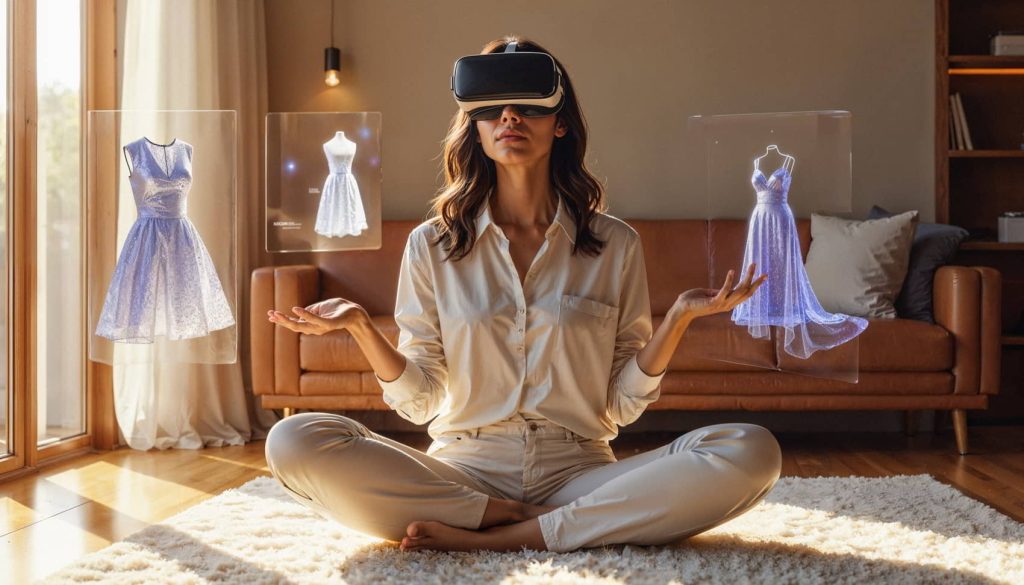As we open ourselves up to the boundless possibilities of technology, our lives and how we experience them have been forever changed. The emergence of Augmented Reality (AR) and Virtual Reality (VR) technology has revolutionised the world of e-commerce. By allowing users to experience products and services virtually, these technologies are transforming how people shop and interact with brands.
With the help of AR and VR app development, businesses can delight consumers with brilliant and unique purchasing experiences. By providing an immersive, interactive experience and bridging the gap between physical and digital shopping, AR and VR app development companies are changing the reality for e-commerce businesses.
Let us dive deep into AR and VR in mobile app development and their impact on eCommerce.
What is AR VR Technology?
AR and VR are immersive technologies that allow users to interact with computer-generated images, graphics, and data in a virtual world.
AR is an interactive experience of a real-world environment that has been modified by computer-generated sensory input such as sound, video, and graphics. AR technology usually involves using a mobile device, such as a smartphone or tablet, and special software to create a virtual version of the real world in which users can interact with objects and their environment.
VR, on the other hand, provides a completely immersive experience for the user. This experience is created by wearing a special headset, such as an Oculus Rift or HTC Vive, and being able to look and move around in a virtual world created by computer-generated images and sound. VR technology allows users to experience a completely immersive environment with a greater level of realism than traditional media and can be used for gaming, entertainment, communication, and various other purposes.
AR and VR are finding exciting new applications in various fields. Companies such as Microsoft, Google, and Apple have all begun to invest heavily in the development of AR and VR technologies, and these technologies have already begun to show great potential in the fields of entertainment, education, communication, and many others.
ECommerce & AR VR Stats
AR and VR in eCommerce give consumers the opportunity for a more immersive shopping experience with AR and VR technologies that allow them to try on clothes, makeup, and accessories virtually; visualise products in their homes; and explore 3D product views. These technologies have provided a major boost to online retailers, as they can now offer customers a full range of products without any physical limitations.
According to a report from Statista, the AR & VR market is projected to reach US$31.12bn in 2023, with an annual growth rate of 13.72%, from 2023 to 2027.
Studies also show that customers are more like 57% likely to purchase a brand that offers AR than one that does not. Another study also shows that by the end of 2023, there will be 1.4 billion AR device users. These numbers show no signs of slowing down either.
Similarly, VR has a direct link to increasing sales. A study by Forbes shows that VR experiences bring in 15% more responses than direct marketing. Consumer spending on these devices has also drastically increased to 34%. Businesses are also heavily investing in VR tech, with retail businesses expecting to put the major chunk of investment into VR at $7.3 billion in 2024.
Benefits of AR/VR in E-commerce
Augmented Reality (AR) and Virtual Reality (VR) technology in e-commerce is rapidly on the rise. From helping customers to “try before they buy” to increasing brand awareness and intensifying consumer product connection, AR and VR in e-commerce offer businesses several benefits.

Better Shopping Experience
Gone are the days when you took guesses when making purchases. AR/VR technology enables customers to try on clothes, furniture, and even test-drive cars from the comfort of their homes. All you need is an AR /VR-enabled eCommerce app. This eliminates the need to visit physical stores, saving time and money for both the customer and the business. By trying before buying, customers can better understand the product and make more informed purchasing decisions, reducing the likelihood of returns.
Increased Brand Awareness
What better way to make heads turn than with the most exciting technology? AR/VR offers ways to make better purchases, which also creates hype around a brand and product. AR/VR technology provides a new platform for businesses to showcase their products and services, reaching a wider audience than traditional marketing methods. It can create interactive and engaging brand experiences, helping increase brand awareness and loyalty among customers.
As Futuristic as it Gets
AR/VR technology can appeal to a younger, tech-savvy demographic looking for an innovative shopping experience. The whole concept removes the need to visit a store but still make good purchases. The use of goggles or e-commerce apps for such purposes makes the whole scenario more convenient and appealing to a younger crowd who are constantly looking for the wow factor.
It can also attract customers who cannot visit a store physically, such as those with mobility issues or living in remote areas.
Personalised Experience
AR/VR technology enables customers to have a more personal connection with products. Instead of making a half-hearted purchase where you are unsure if it is the right decision, AR/VR tech gives you the option of connecting with the product and ensuring it is the right fit. It provides customers with a more immersive and interactive experience, allowing them to get up close and personal with products, helping to build brand loyalty and increase the likelihood of repeat purchases.
Optimise Supply Chain
AR/VR technology can help businesses to optimise their supply chain by reducing the need for physical inventory and reducing waste. Businesses can rely on digital spaces to run businesses instead of renting out shops and physical spaces for customers. Digital spaces can also give businesses valuable insights into customer behaviour, helping to make informed decisions about product development and marketing strategies.
Role of AR/VR in Mobile Development
Mobile app development is one of the major areas that is greatly affected by AR/VR. Let us take a quick look at how AR/VR affects mobile app development.
Better UX
Virtual reality technology brings a new level of performance to the user experience in mobile apps. Virtual reality allows users to enjoy high-quality, uninterrupted results using cutting-edge technology. This allows them to seamlessly use their apps, setting the brand apart from competitors in the same market. The use of virtual reality technology enhances the overall user experience and helps brands stand out in a crowded marketplace.
As a Learning Tool
Virtual reality technology serves as a practical learning tool. Virtual reality’s immersive and interactive nature provides the best and most enjoyable learning experience for users. This opens up new doors and business opportunities for developers, allowing them to venture into new areas and expand their expertise. Virtual reality’s ability to provide an engaging learning experience makes it an indispensable tool in mobile app development.
Better Productivity
Productivity is essential for the success of any business, and virtual reality plays a significant role in enhancing it. AR/VR tools bring an immersive workplace experience and increase employee productivity. The use of virtual reality technology in the workplace creates a more engaging and interactive environment, boosting overall productivity and improving the work experience for employees. By incorporating virtual reality, businesses can streamline operations and improve efficiency.
Monitor and Track Information
Virtual reality technology has the added benefit of facilitating monitoring and tracking. VR technology allows businesses to streamline their operations, improving their ability to monitor and track key data. This can be achieved through the help of mobile app developers who have the expertise to integrate VR into a business’s services.
Better User Satisfaction
Virtual reality technology has the potential to significantly improve user engagement for businesses. In today’s highly competitive market, businesses must create a better engagement experience for their users to succeed. Virtual reality offers a unique solution to this challenge by significantly enhancing user satisfaction. Virtual reality technology has become a valuable tool for businesses looking to increase their user engagement and stay ahead of the competition.
Better Communication
Virtual reality has revolutionised the way businesses communicate with their customers. The innovative nature of virtual reality technology makes it an ideal tool for businesses looking to improve their communication processes, particularly in the realm of mobile apps. By incorporating virtual reality technology into their communication processes, businesses can stay ahead of the curve and meet the evolving needs of their customers.
Brand Loyalty
Virtual reality provides a unique and engaging way for businesses to promote their products or services, and its commitment to delivering a fantastic user experience has made it a valuable tool for companies. By utilising virtual reality, businesses can create a more memorable and positive brand experience for their customers, leading to increased brand loyalty and customer retention.
Examples of AR VR in E-Commerce Mobile Apps

Brands have used AR and VR to apply them to marketing needs and in making purchase decisions. Many brands have used this technology to make the whole process more appealing, effective, and satisfying. Let us look at three top brands that have used AR and VR
SEPHORA
Sephora’s Virtual Artist is a shining example of the potential of augmented reality in e-commerce. This innovative tool provides customers with a unique and interactive experience, allowing them to try on a vast selection of makeup products from Sephora. The Virtual Artist enables users to experiment with various lipstick shades, eyeshadow, false lashes, and much more, all in real-time and on their faces. Additionally, the app offers beauty tutorials, enabling customers to learn how to achieve various looks through a hands-on approach. A cutting-edge feature, Color Match, utilises artificial intelligence to help customers find the perfect shade of makeup for their skin tone simply by uploading a photo. These features combine to provide a seamless, personalised, and fun shopping experience, further establishing Sephora’s Virtual Artist as a leader in the realm of augmented reality in e-commerce.
IKEA
The Swedish home furnishing brand IKEA came up with the creative use of technology for its e-commerce app. The IKEA app offers a unique shopping experience for customers by providing a glimpse into how furniture from their product line will fit into the shopper’s own space. Using augmented reality (AR) technology, the app creates a three-dimensional representation of the selected piece of furniture placed virtually in the room using the smartphone’s camera. This allows customers to envision the furniture in their own space and to experiment with different positioning and placement options to determine the best fit.
L’Oreal
The leading beauty brand, L’Oreal, also stepped up its game with the AR tech in its shopping app, providing an unmatched experience in augmented products and services.
It uses a technology called ModiFace, which it acquired in 2018. This tool allows users to try on makeup products on their faces. It has also enabled sales to increase dramatically. Users can try on hair colours, lip and foundation shades, eyeshadow shades, and much more. With better engagement rates, the app increased the average time consumers spent on the app to 7 minutes and tripled the conversion rates.
Summing Up
AR and VR have dramatically changed the way we experience shopping online. With its unique capabilities, users can try on products, fit products into their home spaces and much more. The advantages it brings to businesses are tremendous, making it a much sought-after addition to everyone’s e-commerce app.
Creating such an AR/VR integrated app requires skill and experience. If you are looking for such a development team, Silwatech is your answer.
As a leading AR VR app development service provider, we are trusted for AR VR app development by clients across Dubai, the Middle East, and Europe.
For reliable VR and AR app development services, reach out to us today.




















